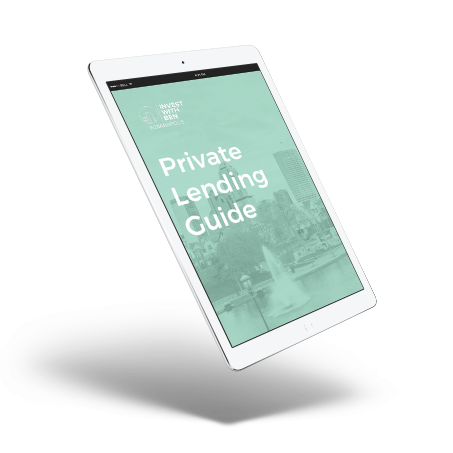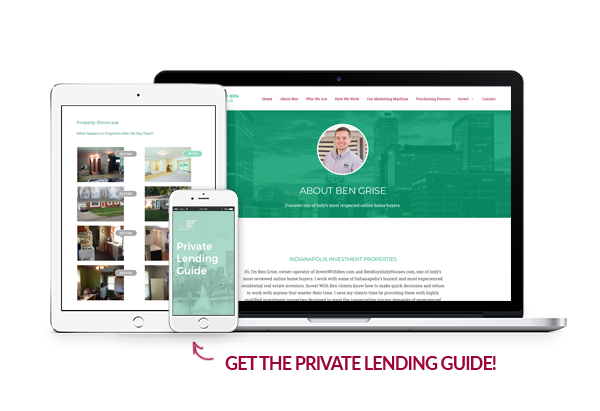More About Private Lending
Clients who lend us money profit just as any bank would, but at a higher rate of return.
We pay our lenders anywhere between 8 and 10% interest on their capital.
As a private lender, instead of dealing with a bank, you can direct your investment capital, including retirement funds, to extremely secure real estate notes and mortgages. Notes and mortgages provide the ultimate security.
Should the borrower default, you as the “bank” have the option to recover your investment as the recorded first‑lien holder of the property. However, if you decide to invest with us please don’t do so hoping we default. We have a 0% default rate.
Remember: the properties we procure are worth significantly more than your investment because of our ability to purchase far below market value. Every asset we acquire is put through a rigorous due diligence and evaluation process.
With the help of our entire team of real estate professionals, we have filtered well over 1,000 properties through this process. Thus, we’re extremely qualified to assess the profitability of a property before it’s ever purchased.
Our name and reputation mean more to our business than anything else, and it’s for that reason that we reject properties that don’t meet our strict purchasing criteria.
As a private lender, instead of dealing with a bank, you can direct your investment capital, including retirement funds, to extremely secure real estate notes and mortgages. Notes and mortgages provide the ultimate security.
Should the borrower default, you as the “bank” have the option to recover your investment as the recorded first‑lien holder of the property. However, if you decide to invest with us please don’t do so hoping we default. We have a 0% default rate.
Remember: the properties we procure are worth significantly more than your investment because of our ability to purchase far below market value. Every asset we acquire is put through a rigorous due diligence and evaluation process.
With the help of our entire team of real estate professionals, we have filtered well over 1,000 properties through this process. Thus, we’re extremely qualified to assess the profitability of a property before it’s ever purchased.
Our name and reputation mean more to our business than anything else, and it’s for that reason that we reject properties that don’t meet our strict purchasing criteria.
Promissory Note: This is the collateral for your investment capital.
Mortgage: This is the document that is recorded with the clerk and recorder at the county courthouse to publicly secure your investment against the property that we are providing as collateral.
Hazard Insurance Policy: This is where you as the private lender would be listed as the “mortgagee” for your protection, in case of a fire or natural disaster. In addition to hazard insurance, we also offer liability insurance on rental properties to protect against casualties. You’ll be named as a mortgagee and notified if the insurance is not kept current. If a claim is filed, the distributions will be used to rebuild or repair the property or pay back the entire principal owed on your investment capital.
Title Insurance Policy: This document protects real estate owners and lenders against any property loss or damage incurred by liens, encumbrances, or property title defects.

Book Appointment with Ben
Learn more about Private Lending by scheduling an appointment to talk one-on-one with Ben about this unique investment opportunity.
5 Easy Steps to Private Lending

STEP 1
Your investment goes into escrow with the aforementioned attorneys and title company, Eagle Land Title.

Step 2
We pay the costs associated with finalizing the closing documents.
Whitelist Our Emails

Step 3
You receive a copy of the original promissory note, a copy of the mortgage, and a proof of the insurance policy.

Step 4
The mortgage and promissory note are filed and recorded at the courthouse.

Step 5
We deposit your return directly into your bank account every month or mail you a check—your choice!
Why Do Real Estate Investors Often Avoid Working with Banks?
A majority of highly successful real estate investors currently work, or have worked at one point in their real estate careers, with private money lenders to fund their real estate transactions. Why is that?
Private money lenders bring speed and efficiency to real estate transactions that banks simply cannot guarantee. Being able to purchase real estate with cash is a powerful weapon in a real estate investor’s arsenal. Many of the sellers we deal with seek quick solutions for their property and typically prefer to close within 15 days or less. Unfortunately, banks require 30–45 days to close loans, and contracts fall apart on many homes because of financing issues. Using quick cash is a selling point for our customers and allows us to negotiate prices significantly below market value in exchange for the quick and hassle‑free services we provide. This in turn substantially lowers our risk as a real estate investor.
Banks are also constantly changing their lending guidelines and aren’t always flexible when it comes to real estate investments. They require applications, have rigid down payment requirements, require approvals and appraisals, charge junk fees, and impose very strict investment guidelines. They also often refuse to loan on non‑conforming product types. For us, and many successful investors like us, banks introduce far too many obstacles and prevent buyers like us from providing the quick services our customers expect when selling their property to us at a discount. With private lending, you can effectively cut out the middle man and lend to us directly, capitalizing on the banks’ lack of efficiency.

Download the Private Lending Guide
Complete the form for answers to more FAQs about private lending and to view our in-depth Private Lending Guide:
